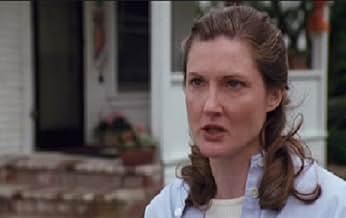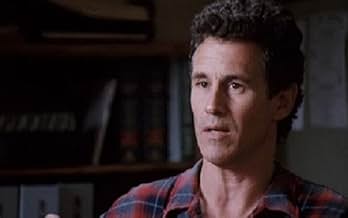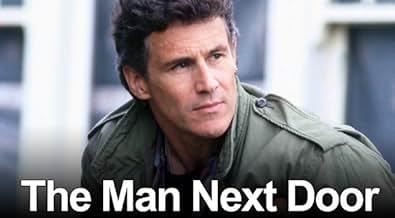A community is shocked to learn that their new neighbor is a convicted sex offender who has been paroled.A community is shocked to learn that their new neighbor is a convicted sex offender who has been paroled.A community is shocked to learn that their new neighbor is a convicted sex offender who has been paroled.
- Director
- Writer
- All cast & crew
- Production, box office & more at IMDbPro
Storyline
Featured review
Michael Ontkean is a relatively good looking fellow. In order to make him believable as a creepy serial rapist type he's given a nasty looking old pick-up truck, the obligatory paint-on tattoo, and (kudos to the make up department) a fairly convincing molar/incisor rot job.
Released from prison, Ontkean's character, Eli, takes up residence in a tired little backwater burg that somehow fails to warrant the residents' chest-beating claims that their town is too good for this slimeball.
Pamela Reed is the one bright spot, working wonders with the thin script in her role as a parole officer using every trick in her bag to bully Ontkean back onto the straight and narrow. Things go well for Eli for a while, but upon learning of his past, the townspeople rally as a slightly-less-believable-than-Clinton-on-the-witness-stand lynch squad.
An error in judgement, or editing, or evidence that director Lamont Johnson simply didn't give a rat's butt how this movie looked, shone through in the requisite night time "angry" mob shot. Inexplicably, he focused the cameras on the extras, blatantly occupied in helpfully waving wide-beam flashing lights up, down and across Ontkean's profile in a painstakingly orchestrated manner. Not enough money in the budget to hire crew members to handle lighting effects perhaps?
The director shouts 'Action' and we see (egregiously half-hearted) "angry" mobs waving really silly looking protest signs, looking for the most part terribly confused. (The town's population is presented as 27,000 and they're all reportedly steaming mad. Watch for the same 30 extras who comprise every thin little "angry" mob scene.)
Other than Reed, and a stellar cameo by the actress portraying the cashier Ontkean may have raped after his release, there's a generally lackadaisical feel to all the performances. Ontkean himself looked positively bemused during the cliche-ridden group therapy scenes. "She wanted it," says one good-old-fellow-rapist-boy to another with a merry bootlicking grin. Scowling and leering on cue Ontkean still comes off about as menacing as Bambi's mother.
Then, suddenly, it's all over. The serial rapist is 'rescued' from the wrath of the 'really mean' townspeople and put into a minimum security halfway house for his own protection.
Meaning what? 'All we are saying, is give rapists a chance'?
The message that audiences are more likely to come away with may well be more along the lines of: 'Everyone involved with this project had mortgages and bills to pay and the entire contingent signed on not because they wanted to make a good movie, but because their agents apparently couldn't get them a better gig for summer hiatus.'
Released from prison, Ontkean's character, Eli, takes up residence in a tired little backwater burg that somehow fails to warrant the residents' chest-beating claims that their town is too good for this slimeball.
Pamela Reed is the one bright spot, working wonders with the thin script in her role as a parole officer using every trick in her bag to bully Ontkean back onto the straight and narrow. Things go well for Eli for a while, but upon learning of his past, the townspeople rally as a slightly-less-believable-than-Clinton-on-the-witness-stand lynch squad.
An error in judgement, or editing, or evidence that director Lamont Johnson simply didn't give a rat's butt how this movie looked, shone through in the requisite night time "angry" mob shot. Inexplicably, he focused the cameras on the extras, blatantly occupied in helpfully waving wide-beam flashing lights up, down and across Ontkean's profile in a painstakingly orchestrated manner. Not enough money in the budget to hire crew members to handle lighting effects perhaps?
The director shouts 'Action' and we see (egregiously half-hearted) "angry" mobs waving really silly looking protest signs, looking for the most part terribly confused. (The town's population is presented as 27,000 and they're all reportedly steaming mad. Watch for the same 30 extras who comprise every thin little "angry" mob scene.)
Other than Reed, and a stellar cameo by the actress portraying the cashier Ontkean may have raped after his release, there's a generally lackadaisical feel to all the performances. Ontkean himself looked positively bemused during the cliche-ridden group therapy scenes. "She wanted it," says one good-old-fellow-rapist-boy to another with a merry bootlicking grin. Scowling and leering on cue Ontkean still comes off about as menacing as Bambi's mother.
Then, suddenly, it's all over. The serial rapist is 'rescued' from the wrath of the 'really mean' townspeople and put into a minimum security halfway house for his own protection.
Meaning what? 'All we are saying, is give rapists a chance'?
The message that audiences are more likely to come away with may well be more along the lines of: 'Everyone involved with this project had mortgages and bills to pay and the entire contingent signed on not because they wanted to make a good movie, but because their agents apparently couldn't get them a better gig for summer hiatus.'
Details
- Release date
- Country of origin
- Language
- Also known as
- El hombre de la casa de al lado
- Filming locations
- Production companies
- See more company credits at IMDbPro
Contribute to this page
Suggest an edit or add missing content




























